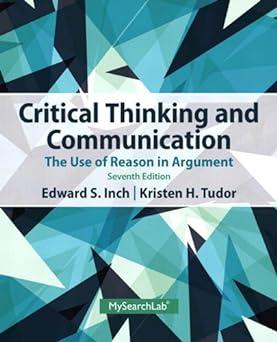1. What questions of fact and value are suggested by the discussion? In Chapter 8, we explored...
Question:
1. What questions of fact and value are suggested by the discussion? In Chapter 8, we explored the arguments in support of selling human organs on the open market.
Box 8.1 outlined many of the issues related to this controversy. The conversation highlighted several issues including the need for more donors and a thriving illicit market in human organs. While there is strong evidence pointing to the need for more human organs, there remain many questions about whether a policy allowing them to be sold on the open market would solve the shortage of organs in the status quo, what the costs and disadvantages associated with such a proposal would be, and even what value assumptions underpin the discussion of such a policy. In the discussion below, Laura and Phil discuss some of the issue.
Laura: I realize that we have a shortage of organs, and that this means many people die waiting for organs, but we need to consider the implications for the poor. They can be easily exploited for the sale of their organs, which would be an abuse of their basic human dignity. I think there’s a really good chance that allowing the sale of human organs would end up creating a market that benefits only the wealthy and the powerful. And what about families who might be pressured to stop medical treatment of loved ones so that organs can be harvested?
Phil: It does seem like allowing organs to be sold on the open market privileges the rich over the poor, unless there were some very strict controls over it. But what really bothers me is that this assumes that people can claim ownership over body parts of the deceased. This objectification of the human body has serious implications for society.
Laura: I’ve heard some compare selling organs to selling blood plasma or sperm, but I think there are more ethical and safety issues to be considered with organ selling.
For one thing, transplants are much riskier than donating blood plasma or donating sperm. The safety factors and risks of the surgery make the market for organs more dangerous. And the scarcity of organs in comparison to sperm or blood means that the costs would be much higher.
Phil: We certainly should try to find a way to increase the number of donors in the United States, but we have to think about the ethical implications of selling organs.
The issue is much larger than getting paid to save a life. It’s not the right way to solve the problem.
Laura: I agree, it seems like a better policy might be to crack down on the illicit market while finding nonmonetary ways to compensate those willing to donate, such as health care credits, or help with funeral expenses for families who donate the organs of deceased loved ones.
Step by Step Answer:

Critical Thinking And Communication The Use Of Reason In Argument
ISBN: 9780205925773
7th Edition
Authors: Edward S. Inch, Kristen H. Tudor






